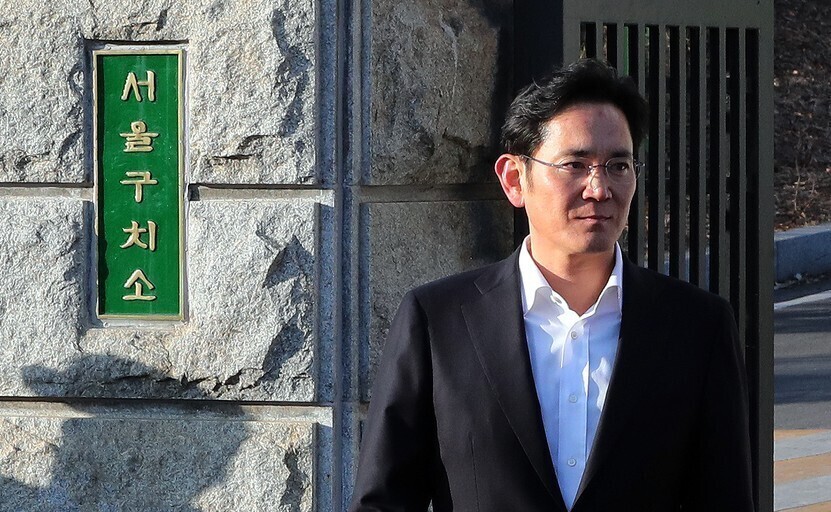hankyoreh
Links to other country sites 다른 나라 사이트 링크
Samsung heir Lee Jae-yong to be released on parole Friday

The South Korean Ministry of Justice (MOJ) parole review committee decided Monday to parole Samsung Electronics Vice Chairman Lee Jae-yong.
The committee’s decision was immediately approved by Minister of Justice Park Beom-kye, paving the way for Lee to leave prison 207 days after he returned there on charges related to a government influence-peddling scandal. Lee and other parolees will be released from 54 correctional facilities nationwide on Friday.
“Lee Jae-yong was included among [the parolees] out of consideration for the national economic situation and global economic environment as the COVID-19 pandemic continues into the long term,” Park said in a briefing at the MOJ complex that day following the parole review committee’s meeting.
Explaining the factors behind the decision, he added, “The decision was based on full consideration of various factors including social sentiments and [Lee’s] attitude during detention.”
But Lee is expected to face difficulties returning immediately to the management front lines, as he would need separate approval from the Minister of Justice to return to management activities following his conditional release.
Even before the committee met Monday, many observers in the political and legal worlds were predicting a strong likelihood that Lee would be paroled.
Lee, who had completed 60% of his sentence as of late July, was classified as a model prisoner and easily passed the Seoul Detention Center’s preliminary parole review. In April 2021, the MOJ loosened the requirements for parole reviews from 80% of the prisoner’s sentence completed to 60% in consideration of factors such as COVID-19 cluster infections in correctional facilities.
Many observers in civil society voiced criticism over the loosening of parole standards and argued that it was inappropriate to parole Lee when he is facing other trials related to improper merger procedures, accounting improprieties, and propofol use.
In response, the MOJ explained that “67 prisoners in 2020 had paroles approved while additional trials were underway, and 244 prisoners over the past three years have been paroled without completing 70% of their sentence.”
The ministry also announced plans to “expand paroles going forward for prisoners with a low likelihood of repeat offenses.”
Park also asserted that he “consistently pledged to expand paroles” since becoming Minister of Justice.
“We will continue to expand paroles with a target of reducing the current average accommodation rate for correctional facilities from 110% to 105%,” he added.
On Monday, the parole review committee reviewed and made parole decisions for 1,057 prisoners in all. The Minister of Justice approved the paroles of 810 of them who were deemed suitable candidates. Also included as a humanitarian gesture were 155 prisoners with underage children and 167 others whose crimes were determined to be based on survival needs.
The attendees at the review meeting Monday reportedly included the committee’s chairperson, Vice Minister of Justice Kang Sung-kook, four internal MOJ committee members, and five external committee members, including Seoul High Court chief judge Yoon Gang-yeol.
South Korea’s civil society was vocally critical of the decision to parole Lee.
In a statement released Monday, the group MINBYUN-Lawyers for a Democratic Society called the decision “privileged treatment granted to a special social segment.”
“When a person who committed the serious crime of embezzling 8.6 billion won in company money to give to the President as a bribe can be paroled so easily simply because he is a chaebol [heir], that will have the result of grievously damaging the fairness of the judicial system,” the group said.
By Ock Kee-won, staff reporter
Please direct comments or questions to [english@hani.co.kr]

Editorial・opinion
![[Editorial] Intensifying US-China rivalry means Seoul must address uncertainty with Beijing sooner than later [Editorial] Intensifying US-China rivalry means Seoul must address uncertainty with Beijing sooner than later](https://flexible.img.hani.co.kr/flexible/normal/500/300/imgdb/original/2024/0517/8117159322045222.jpg) [Editorial] Intensifying US-China rivalry means Seoul must address uncertainty with Beijing sooner than later
[Editorial] Intensifying US-China rivalry means Seoul must address uncertainty with Beijing sooner than later![[Column] When ‘fairness’ means hate and violence [Column] When ‘fairness’ means hate and violence](https://flexible.img.hani.co.kr/flexible/normal/500/300/imgdb/original/2024/0516/7417158465908824.jpg) [Column] When ‘fairness’ means hate and violence
[Column] When ‘fairness’ means hate and violence- [Editorial] Yoon must stop abusing authority to shield himself from investigation
- [Column] US troop withdrawal from Korea could be the Acheson Line all over
- [Column] How to win back readers who’ve turned to YouTube for news
- [Column] Welcome to the president’s pity party
- [Editorial] Korea must respond firmly to Japan’s attempt to usurp Line
- [Editorial] Transfers of prosecutors investigating Korea’s first lady send chilling message
- [Column] Will Seoul’s ties with Moscow really recover on their own?
- [Column] Samsung’s ‘lost decade’ and Lee Jae-yong’s mismatched chopsticks
Most viewed articles
- 1[Editorial] Transfers of prosecutors investigating Korea’s first lady send chilling message
- 2For new generation of Chinese artists, discontent is disobedience
- 3[Photo] 1,200 prospective teachers call death of teacher “social manslaughter”
- 4[Exclusive] Unearthed memo suggests Gwangju Uprising missing may have been cremated
- 5[Column] Samsung’s ‘lost decade’ and Lee Jae-yong’s mismatched chopsticks
- 6[Column] When ‘fairness’ means hate and violence
- 7Xi, Putin ‘oppose acts of military intimidation’ against N. Korea by US in joint statement
- 8S. Korea “monitoring developments” after report of secret Chinese police station in Seoul
- 9[Special reportage- part I] Elderly prostitution at Jongmyo Park
- 10[News analysis] Samsung in management crisis due to owner risk